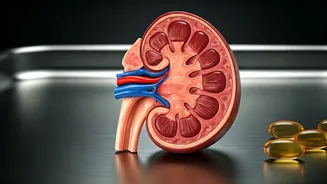Vitamin D Overdose?
Vitamin D, a fat-soluble vitamin, is crucial for numerous bodily functions. It supports calcium absorption, which is vital for bone health, and it plays
a role in immune function, muscle strength, and mood regulation. However, because vitamin D is fat-soluble, the body stores excess amounts, potentially leading to toxicity. This is a significant distinction from water-soluble vitamins, which the body can easily flush out. Vitamin D toxicity, also known as hypervitaminosis D, is typically caused by excessive supplementation rather than dietary intake or sun exposure. While sunlight and a balanced diet provide vitamin D, the body regulates these sources effectively, making toxicity less likely from natural means.
The Toxicity Causes
The primary cause of vitamin D toxicity is excessive supplementation. Taking large doses of vitamin D supplements over a period can lead to a buildup of the vitamin in the body. While dietary sources such as fatty fish, egg yolks, and fortified foods like milk contribute to vitamin D intake, they usually don't pose a risk of toxicity on their own. The liver converts vitamin D into a form the body can use; excess vitamin D can result in elevated blood levels of calcium (hypercalcemia), which then leads to symptoms. In some cases, medical errors or misinterpretations of blood test results could contribute to this condition. It is important to remember that it is crucial to adhere to recommended dosage guidelines and consult with a healthcare professional before taking supplements.
Symptoms: Be Alert
The symptoms of vitamin D toxicity can vary, but commonly include gastrointestinal issues such as nausea, vomiting, and loss of appetite. These initial symptoms can progress to more serious problems like excessive thirst, frequent urination, and weakness. Because of the elevated blood calcium levels, individuals may experience bone pain and kidney problems. Severe hypercalcemia can lead to kidney stones, kidney failure, and, in extreme cases, heart rhythm abnormalities, which can be life-threatening. Early recognition of these symptoms and seeking medical attention is crucial to prevent serious health consequences, highlighting the importance of understanding the warning signs.
Diagnosis: Seeking Help
Diagnosing vitamin D toxicity involves a combination of medical history, physical examination, and blood tests. A doctor will typically inquire about the individual's supplement intake and assess their symptoms. Blood tests are essential to measure vitamin D levels and calcium levels in the blood. High levels of both vitamin D and calcium are indicative of toxicity. Other tests, such as kidney function tests and electrocardiograms (ECGs), might be done to evaluate potential organ damage, providing a comprehensive assessment of the patient's health status. Proper diagnosis ensures that the right treatment plan can be implemented promptly and effectively to address the condition and prevent further complications.
Reversing the Overload
The primary treatment for vitamin D toxicity is to discontinue any vitamin D supplements. In mild cases, stopping supplementation and increasing fluid intake may be sufficient to reduce calcium levels. Severe cases require more intensive medical interventions. These might include intravenous fluids to help flush calcium from the body, medications such as corticosteroids or bisphosphonates to reduce blood calcium, and in severe situations, dialysis may be required. Monitoring kidney function and blood calcium levels is essential during the recovery period to ensure the effectiveness of the treatment plan. Following medical advice and making lifestyle adjustments are crucial in managing and reversing vitamin D toxicity effectively.
Prevention: Stay Safe
Preventing vitamin D toxicity involves a proactive approach. It starts with following the recommended daily allowance for vitamin D, which varies depending on age and health status. The best approach is to have regular blood tests to check your vitamin D levels, especially if you are taking supplements. Always consult a healthcare professional before starting any new supplements to determine the appropriate dosage and to monitor your health. Be cautious about the amount of vitamin D in fortified foods, and make sure that you are not exceeding your daily intake. Avoid taking high doses of vitamin D unless specifically prescribed by a doctor, ensuring that you strike a balance to promote your health.













